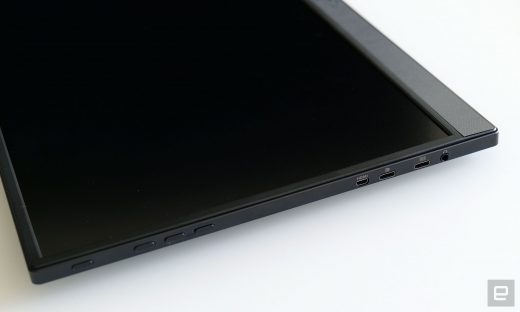What we bought: How a portable monitor made working from home a lot easier
What we bought: How a portable monitor made working from home a lot easier
It’s a good option when you don’t have room for a traditional external display.

Even for someone like me who likes working from home, the pandemic has made things a challenge – especially in my small 1,000 square-foot two-bedroom apartment. You see, when my wife and I welcomed our first child last year, dedicated working spaces became scarce. So I addressed the situation the best way I know how: with tech. In this case an ASUS ROG Strix XG17AHP portable monitor.
Before my son arrived, we actually had a pretty good setup going. I used our second bedroom as an office and very occasional guest room. And when all the office buildings closed in early 2020 due to Covid-19, we managed to find room for another desk in our bedroom. It wasn’t ideal because, even though I’m a gadget nerd, we try to keep the bedroom free of unnecessary screens and distractions. But we each had our own dedicated working space with dual monitors, and enough room between our desks that we could jump on video calls without disturbing one another. It was awkward but acceptable.
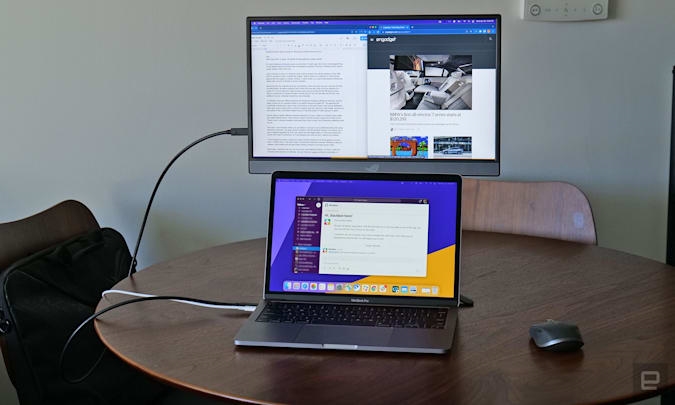
But then our little bundle of joy threw a drool-covered wrench into those plans. Now just to be clear, I don’t begrudge him one bit. Parents often have to make sacrifices for kids, and more often than not, we’re happy to do so. But I think it’s fair to say that an office/nursery just isn’t a good combo. So after my son outgrew his bassinet and stopped sleeping in our room, I had to move my gear out (well most of it anyway) so he could have a real bedroom of his own.
What made this a bit more challenging is that my main computer at home is a desktop. I’ve always been a big PC person, and I love the speed and flexibility you get with a custom-built rig. (Side note: With work from home becoming a more permanent thing, I feel like there are a lot of people that would benefit from switching to a desktop. Assuming you have the space for it, of course). The downside of this is that I’m pretty limited in where I could put my PC. Big shock I know, but a desktop sort of necessitates having a desk. Thankfully, my wife graciously offered to let me use the one in our bedroom (which I honestly can’t appreciate enough), while she moved her workspace out to our dining table in the living room.
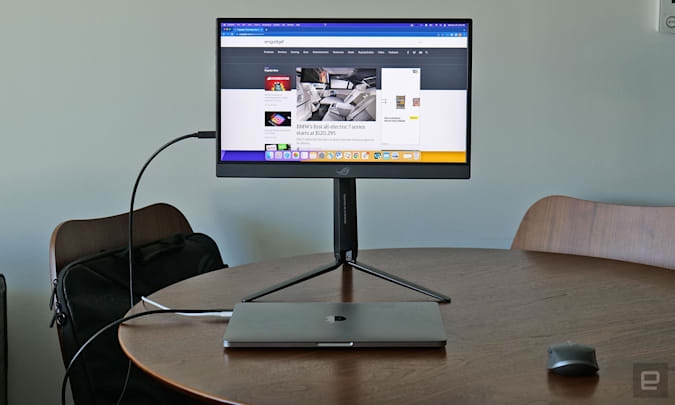
At this point, you’re probably envisioning a host of issues. Since we eat dinner there, setting up dual monitors isn’t really an option. This meant my wife was completely reliant on her 13-inch MacBook Pro, which doesn’t offer a lot of screen space and messes with her posture. Looking down at a laptop screen for eight (or more) hours a day is a surefire recipe for chronic neck and back pain.
That’s where the ASUS’ ROG Strix XG17AHP portable monitor comes in. At first glance, it seems like overkill for general productivity, and it is. It has a 240Hz refresh rate and support for AMD FreeSync, which are great for gaming but don’t do much when you’re looking at spreadsheets. There’s even a built-in 7,800 mAh battery so you can use it completely untethered for four to five hours. And with a price of $600, the ROG Strix XG17AHP is two to three times more expensive than a lot of competitors, particularly the traditional business-oriented ones.
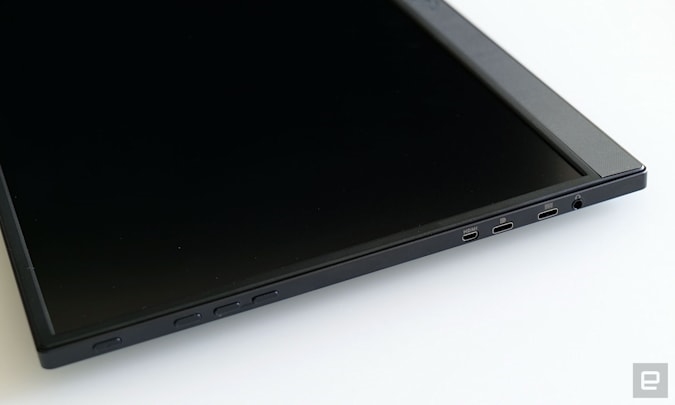
But honestly, I feel like that money has been well spent. My personal philosophy is that for something you’re going to use a lot, it’s better to spend a little extra than pinch pennies and end up with an unsatisfactory device. Unlike most of its rivals, the ROG Strix XG17AHP comes with a stand, and I’m not talking about a simple kickstand. It’s a full-on detachable tripod, which means you can position the screen so it sits above your laptop’s display, instead of off to the side. No need to crane your neck. Important apps live up top on the portable monitor, while less critical stuff like Slack live down below.
The ROG Strix XG17AHP also measures 17.3-inches across, which makes it one of the largest portable monitors you can buy. Most enterprise-focused alternatives top out at 14 or 15 inches, and while we probably would have gone even larger if we could, there aren’t really any 19-inch or larger portable monitors that offer the same level of specs and features. Sure, the monitor’s brightness of 300 nits could be better, but its matte coating makes it easy to look at all day – even in sunny rooms with lots of reflections.
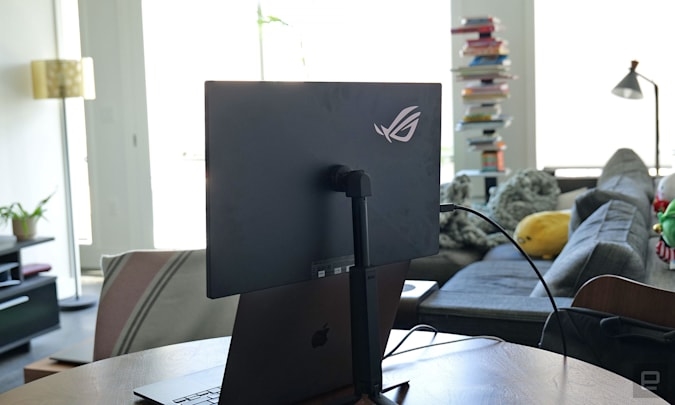
Meanwhile, thanks to support for video and power delivery over USB-C, setting up the monitor only requires a single cable. This makes it super easy to break down and pack away when friends or family come over. And during the week when we’re too lazy to do that, the whole kit is slim enough we can just push it to the side and still have plenty of room for food.
I also want to give ASUS props for including a bunch of useful accessories. The monitor comes with a carrying bag and a foldable screen protector that doubles as a kickstand, along with a USB-C cable, a USB-C to USB-A adapter, a power brick, and even an HDMI to micro HDMI cable – in case your PC doesn’t support video over USB. My only gripe is that the locking mechanism for its height adjustment isn’t super secure. So if I press hard, even when it’s locked, the monitor still moves up and down.
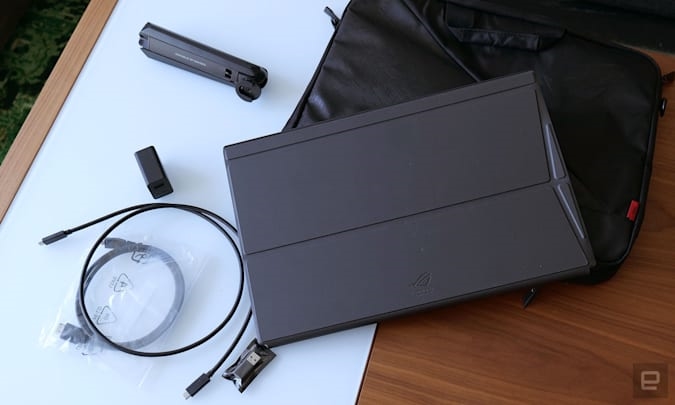
But this one demerit doesn’t really detract from all its positives. That’s because while the ROG Strix XG17AHP isn’t as good as a regular monitor, it’s way more than simply adequate. It’s flexible and it fits in my life (and on my table) in a way that a regular desktop display can’t. It even has a lot of potential as a handy companion for my Switch while traveling. Though due to the pandemic, I haven’t had a chance to test that out yet. And while my wife and I are thinking about getting a bigger place, with the housing market the way it is, moving isn’t in our immediate future. So until we upgrade to a larger home, ASUS’ portable gaming monitor is filling an important role when it comes to making a cramped work from home situation a lot more tolerable.
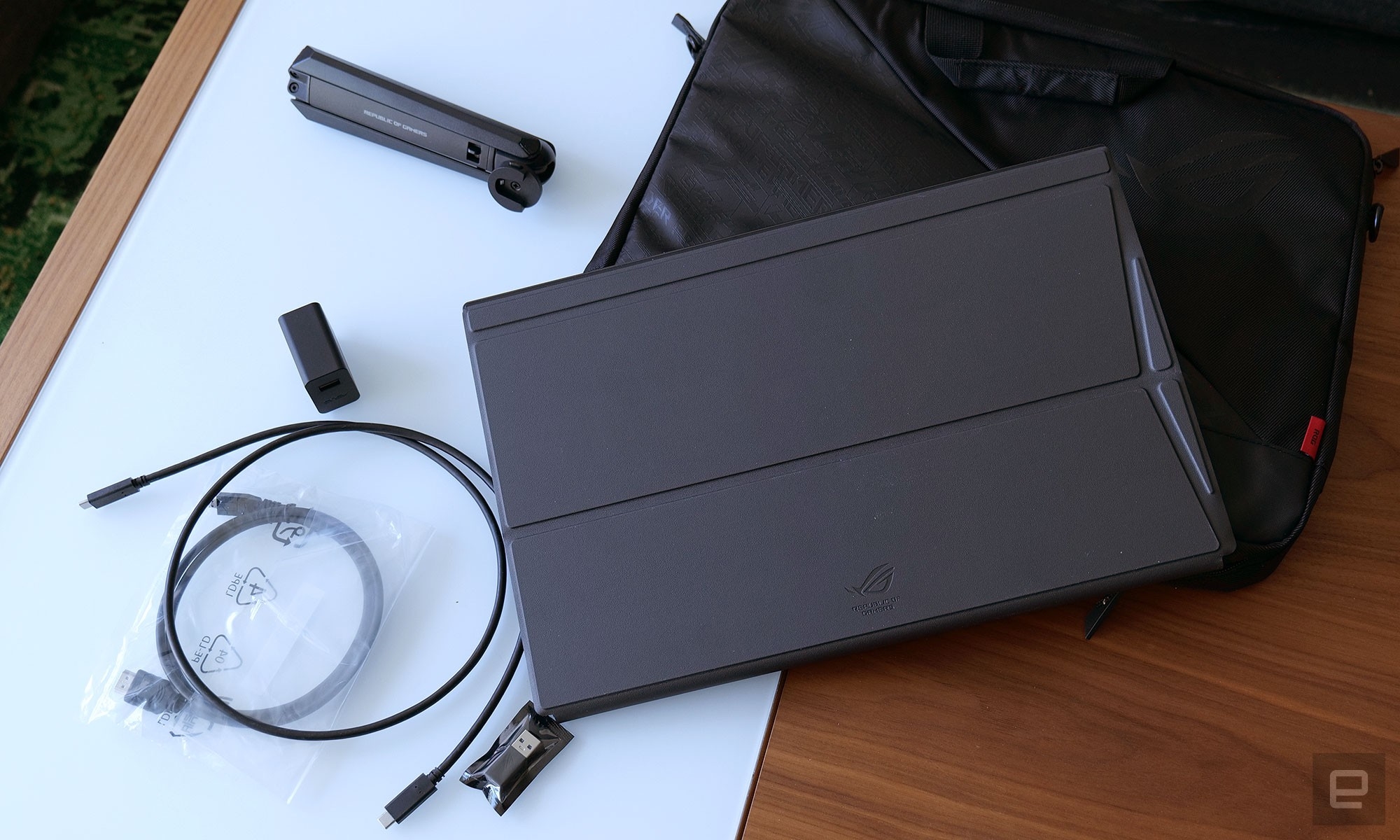
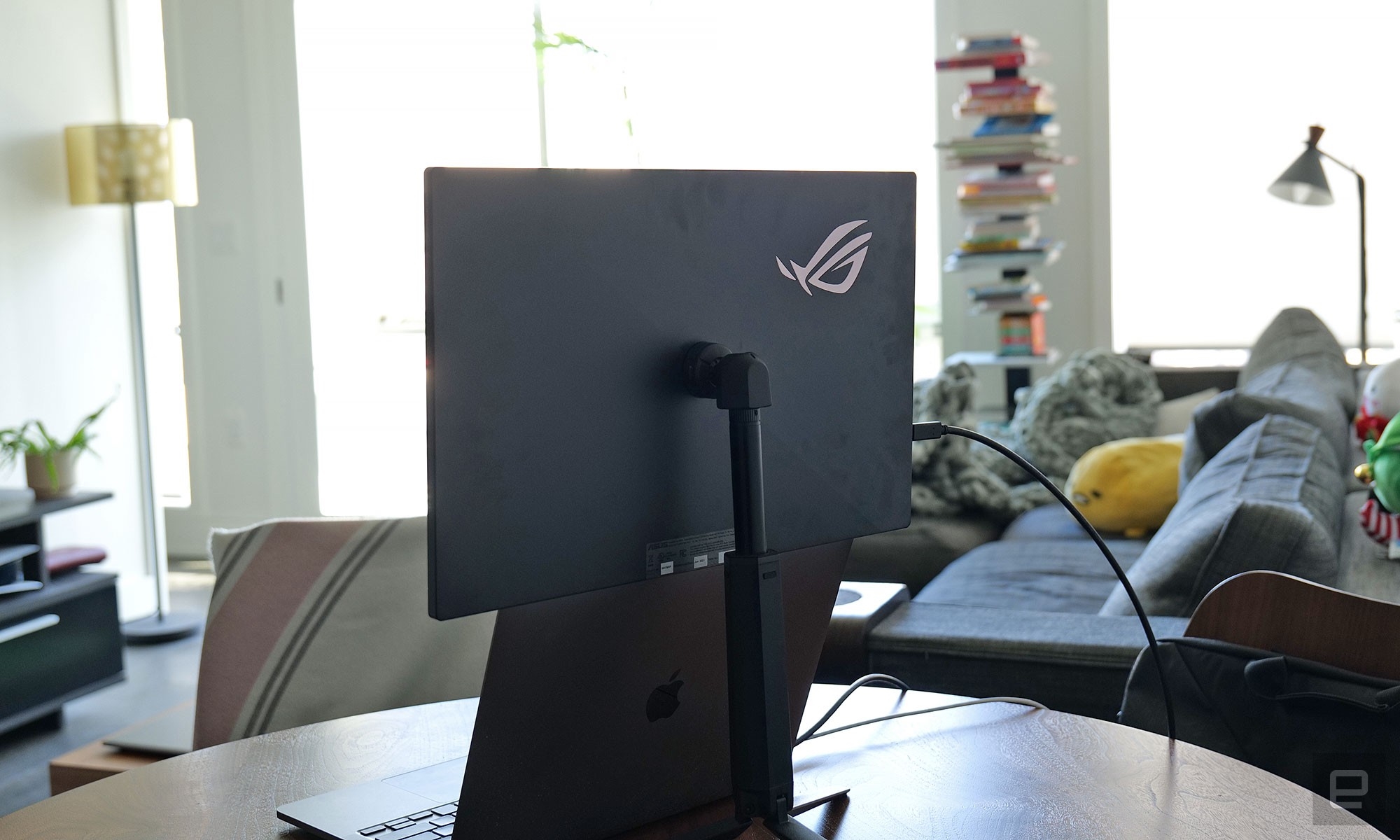
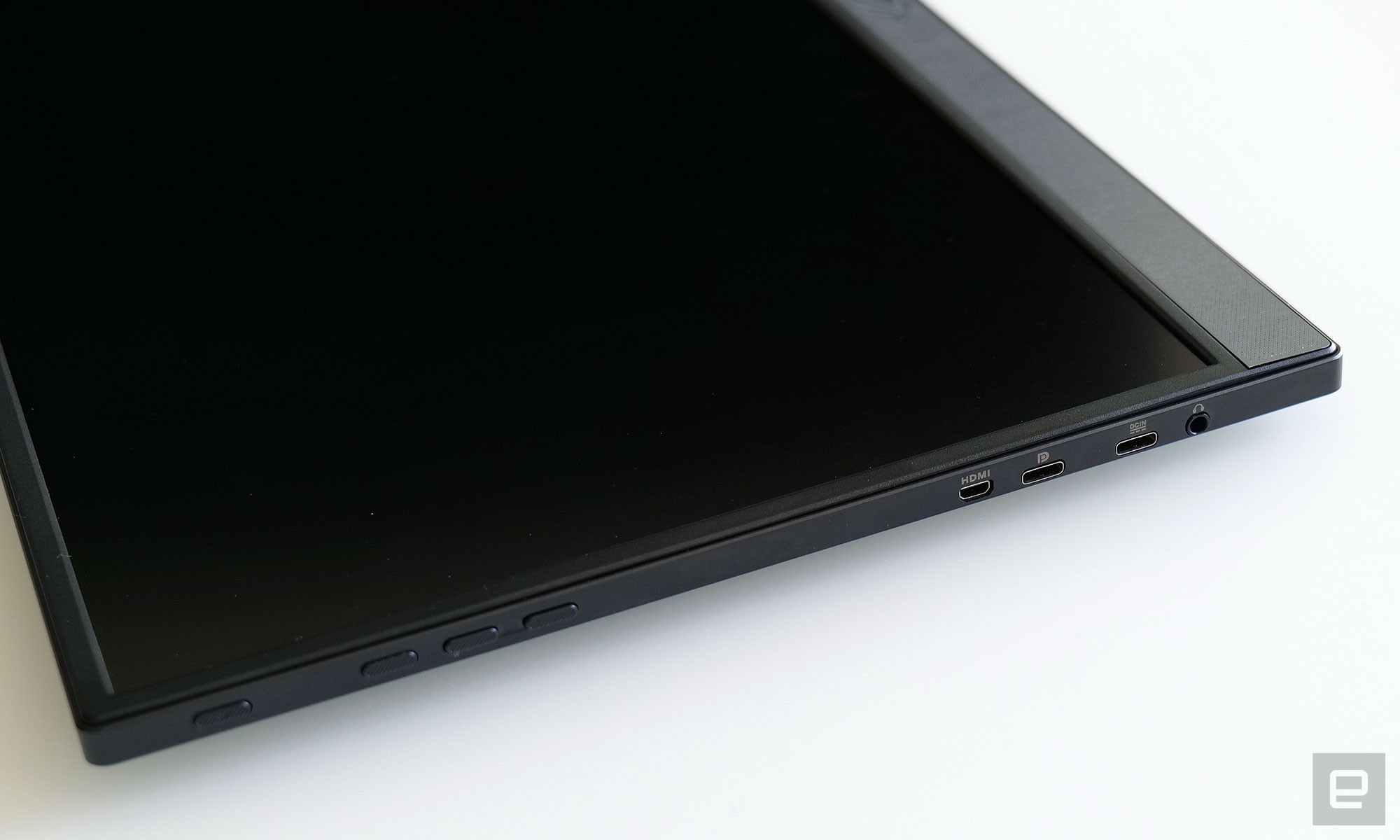
(32)

